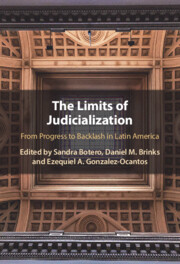
-
Select format
-
- Publisher:
- Cambridge University Press
- Publication date:
- August 2022
- August 2022
- ISBN:
- 9781009093859
- 9781009098342
- 9781009096164
- Dimensions:
- (229 x 152 mm)
- Weight & Pages:
- 0.698kg, 362 Pages
- Dimensions:
- (229 x 152 mm)
- Weight & Pages:
- 0.532kg, 362 Pages
You may already have access via personal or institutional login
Book description
Latin America was one of the earliest and most enthusiastic adopters of what has come to be known as the judicialization of politics - the use of law and legal institutions as tools of social contestation to curb the abuse of power in government, resolve policy disputes, and enforce and expand civil, political, and socio-economic rights. Almost forty years into this experiment, The Limits of Judicialization brings together a cross-disciplinary group of scholars to assess the role that law and courts play in Latin American politics. Featuring studies of hot-button topics including abortion, state violence, judicial corruption, and corruption prosecutions, this volume argues that the institutional and cultural changes that empowered courts, what the editors call the 'judicialization superstructure,' often fall short of the promise of greater accountability and rights protection. Illustrative and expansive, this volume offers a truly interdisciplinary analysis of the limits of judicialized politics.
Reviews
“The Limits of Judicialization pushes the boundaries of the field. It is a seminal contribution to the study of judicial politics in comparative perspective, and an essential read for anyone interested in courts in Latin America, including graduate students, scholars, and practitioners. It engages masterfully with existing research and opens new and fruitful avenues for future work in the region and beyond.”
Raul Sanchez-Urribarri - Senior Lecturer in Crime, Justice and Legal Studies, La Trobe University, Melbourne
“Illuminating how a ‘superstructure of judicialization’ propelled courts into politics in Latin America, this extraordinary volume examines the results, and indeed limitations, of judicial involvement in public policy and political disputes in the region. Through a rich cross-disciplinary, cross-regional dialogue, contributors’ portraits reveal how institutional weakness and entrenched interests compromise courts’ ability to enliven progressive promises and punish public misconduct.”
Diana Kapiszewski - Distinguished Associate Professor of Government, Georgetown University
“Constitutional reform across Latin America in the late 20th century created new judicial pathways for addressing social and institutional challenges at the heart of the democratization project. This essential collection of essays from leading scholars illuminates the political challenges that the region’s courts inherited as they attempted to carry out their new roles as well as several unintended consequences of judicializing politics.”
Jeffrey K. Staton - Professor of Political Science, Emory University
“The Limits of Judicialization explains why the judicialization of politics failed to guarantee greater rights protection and signals key factors for understanding the role of courts in authoritarian regression. The combination of new empirical data and rigorous theory make this a particularly useful book for the classroom.”
Rachel Sieder - Senior Research Professor, Center for Research and Graduate Studies in Social Anthropology (CIESAS), Mexico City
Contents
Metrics
Altmetric attention score
Full text views
Full text views help Loading metrics...
Loading metrics...
* Views captured on Cambridge Core between #date#. This data will be updated every 24 hours.
Usage data cannot currently be displayed.
Accessibility standard: Unknown
Why this information is here
This section outlines the accessibility features of this content - including support for screen readers, full keyboard navigation and high-contrast display options. This may not be relevant for you.
Accessibility Information
Accessibility compliance for the PDF of this book is currently unknown and may be updated in the future.


